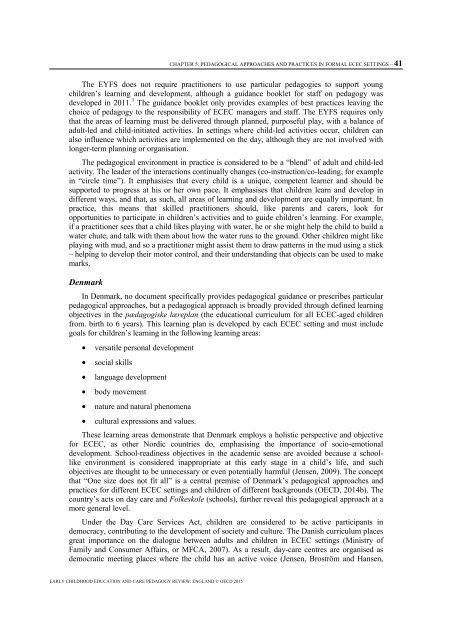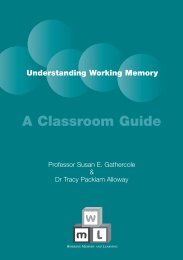early-childhood-education-and-care-pedagogy-review-england.pdf?utm_content=bufferb49b1&utm_medium=social&utm_source=twitter
early-childhood-education-and-care-pedagogy-review-england.pdf?utm_content=bufferb49b1&utm_medium=social&utm_source=twitter
early-childhood-education-and-care-pedagogy-review-england.pdf?utm_content=bufferb49b1&utm_medium=social&utm_source=twitter
Create successful ePaper yourself
Turn your PDF publications into a flip-book with our unique Google optimized e-Paper software.
CHAPTER 5: PEDAGOGICAL APPROACHES AND PRACTICES IN FORMAL ECEC SETTINGS – 41The EYFS does not require practitioners to use particular pedagogies to support youngchildren’s learning <strong>and</strong> development, although a guidance booklet for staff on <strong>pedagogy</strong> wasdeveloped in 2011. 1 The guidance booklet only provides examples of best practices leaving thechoice of <strong>pedagogy</strong> to the responsibility of ECEC managers <strong>and</strong> staff. The EYFS requires onlythat the areas of learning must be delivered through planned, purposeful play, with a balance ofadult-led <strong>and</strong> child-initiated activities. In settings where child-led activities occur, children canalso influence which activities are implemented on the day, although they are not involved withlonger-term planning or organisation.The pedagogical environment in practice is considered to be a “blend” of adult <strong>and</strong> child-ledactivity. The leader of the interactions continually changes (co-instruction/co-leading, for examplein “circle time”). It emphasises that every child is a unique, competent learner <strong>and</strong> should besupported to progress at his or her own pace. It emphasises that children learn <strong>and</strong> develop indifferent ways, <strong>and</strong> that, as such, all areas of learning <strong>and</strong> development are equally important. Inpractice, this means that skilled practitioners should, like parents <strong>and</strong> <strong>care</strong>rs, look foropportunities to participate in children’s activities <strong>and</strong> to guide children’s learning. For example,if a practitioner sees that a child likes playing with water, he or she might help the child to build awater chute, <strong>and</strong> talk with them about how the water runs to the ground. Other children might likeplaying with mud, <strong>and</strong> so a practitioner might assist them to draw patterns in the mud using a stick– helping to develop their motor control, <strong>and</strong> their underst<strong>and</strong>ing that objects can be used to makemarks.DenmarkIn Denmark, no document specifically provides pedagogical guidance or prescribes particularpedagogical approaches, but a pedagogical approach is broadly provided through defined learningobjectives in the pædagogiske læreplan (the <strong>education</strong>al curriculum for all ECEC-aged childrenfrom. birth to 6 years). This learning plan is developed by each ECEC setting <strong>and</strong> must includegoals for children’s learning in the following learning areas:• versatile personal development• social skills• language development• body movement• nature <strong>and</strong> natural phenomena• cultural expressions <strong>and</strong> values.These learning areas demonstrate that Denmark employs a holistic perspective <strong>and</strong> objectivefor ECEC, as other Nordic countries do, emphasising the importance of socio-emotionaldevelopment. School-readiness objectives in the academic sense are avoided because a schoollikeenvironment is considered inappropriate at this <strong>early</strong> stage in a child’s life, <strong>and</strong> suchobjectives are thought to be unnecessary or even potentially harmful (Jensen, 2009). The conceptthat “One size does not fit all” is a central premise of Denmark’s pedagogical approaches <strong>and</strong>practices for different ECEC settings <strong>and</strong> children of different backgrounds (OECD, 2014b). Thecountry’s acts on day <strong>care</strong> <strong>and</strong> Folkeskole (schools), further reveal this pedagogical approach at amore general level.Under the Day Care Services Act, children are considered to be active participants indemocracy, contributing to the development of society <strong>and</strong> culture. The Danish curriculum placesgreat importance on the dialogue between adults <strong>and</strong> children in ECEC settings (Ministry ofFamily <strong>and</strong> Consumer Affairs, or MFCA, 2007). As a result, day-<strong>care</strong> centres are organised asdemocratic meeting places where the child has an active voice (Jensen, Broström <strong>and</strong> Hansen,EARLY CHILDHOOD EDUCATION AND CARE PEDAGOGY REVIEW: ENGLAND © OECD 2015



